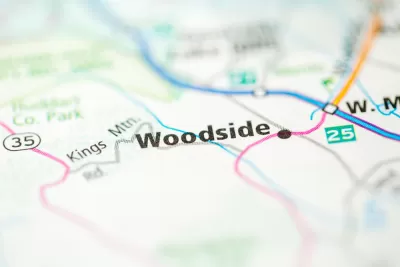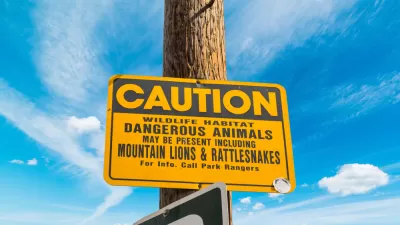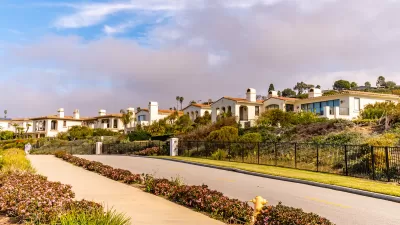Woodside, a small town in the South Bay Area of California, has invented a new method for resisting state-mandated zoning reforms.

Angela Swartz reports from Woodside, California, a town of 5,500 people in the South Bay Area, about the city's plans to reject the state's new zoning law, Senate Bill 9. Woodside's reason for avoiding state mandated density: the entire town is mountain lion habitat.
Planetizen readers know the beginning of this story: SB 9, approved in September 2021 before going into effect at the beginning of the year, allows residential property owners throughout the state to split their properties and build up to four residential units. With the law, California followed Oregon as the second state to preempt local zoning laws by mandating the end of single-family zoning. Local jurisdictions are taking similar actions, led by the city of Minneapolis in 2019 and followed by a wave of cities like Charlotte, Berkeley, and Sacramento, to name a few examples from 2021.
Cities in both Oregon and California have already been getting creative in resisting the new state preemption—using the tools of historic preservation, for example—but the city of Woodside chose a different route.
According to Swartz:
Town officials found a clause in the law that prohibits development in areas identified as habitats for protected species. Mountain lions are a protected species because they are a candidate for the California Endangered Species Act and Woodside, in "its entirety" is a mountain lion habitat, according to a Jan. 27 memo from Town Planning Director Jackie Young.
Swartz also provides background on the town's development politics and notes that the city is facing the prospect of needing to zoned capacity for 358 units between 2023 and 2031 under the state's Regional Housing Needs Allocation process. The town is currently updating its Housing Element.
FULL STORY: Woodside freezes SB 9 projects, citing an exemption for mountain lion habitats

Maui's Vacation Rental Debate Turns Ugly
Verbal attacks, misinformation campaigns and fistfights plague a high-stakes debate to convert thousands of vacation rentals into long-term housing.

Planetizen Federal Action Tracker
A weekly monitor of how Trump’s orders and actions are impacting planners and planning in America.

San Francisco Suspends Traffic Calming Amidst Record Deaths
Citing “a challenging fiscal landscape,” the city will cease the program on the heels of 42 traffic deaths, including 24 pedestrians.

Defunct Pittsburgh Power Plant to Become Residential Tower
A decommissioned steam heat plant will be redeveloped into almost 100 affordable housing units.

Trump Prompts Restructuring of Transportation Research Board in “Unprecedented Overreach”
The TRB has eliminated more than half of its committees including those focused on climate, equity, and cities.

Amtrak Rolls Out New Orleans to Alabama “Mardi Gras” Train
The new service will operate morning and evening departures between Mobile and New Orleans.
Urban Design for Planners 1: Software Tools
This six-course series explores essential urban design concepts using open source software and equips planners with the tools they need to participate fully in the urban design process.
Planning for Universal Design
Learn the tools for implementing Universal Design in planning regulations.
Heyer Gruel & Associates PA
JM Goldson LLC
Custer County Colorado
City of Camden Redevelopment Agency
City of Astoria
Transportation Research & Education Center (TREC) at Portland State University
Jefferson Parish Government
Camden Redevelopment Agency
City of Claremont





























